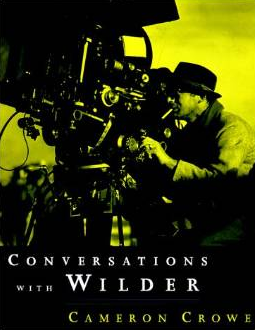Summer is always a good time to vary perspective. On the book front this summer, “Conversations With Wilder“, by Cameron Crowe, offered me some new perspectives on story.
Billy Wilder (1906-2002) was a legendary Hollywood movie writer and director. (Double Indemnity, Sunset Boulevard, Some Like it Hot, The Apartment and many more).
Conversations with Wilder is visual candy; many photos of famous folks, interspersed with entertaining stories and reveals.
Wilder’s Tips for Writers and Storytellers
Wilder’s tips are more than just adhoc tips. They hang together. It’s writing as storytelling. Storytelling matters. Folks like us, of a collaborative mindset, need to be better at telling stories. Here’s Wilder tips, supplemented with some associative thoughts from moi:
- The audience is fickle.
- Grab ‘em by the throat and never let ‘em go. (speaking of never letting go; “Daily life is foreplay for relationships.” ~ Kate Feldman)
- Develop a clean line of action for your leading character.
- Know where you’re going. (“If you don’t know where you are going, you’ll end up someplace else.” Yogi Berra)
- The more subtle and elegant you are in hiding your plot points, the better you are as a writer.
- If you have a problem with the third act, the real problem is in the first act.
- Let the audience add up two plus two. They’ll love you forever. (Sounds like the life of a mediator; letting the disputing parties decide. Though, I could use more of the love…forever part.)
- In doing voice-overs, be careful not to describe what the audience already sees. Add to what they are seeing. (So, why are you repeating, word for word, the bullet points on your Powerpoint slide?)
- The event that occurs at the second-act curtain triggers the end of the movie. (reminds me of Managing Transitions, William Bridges’ fine book about getting from here to there)
- The third act must build, build, build in tempo and action until the last event, and then — (In business, momentum is everything.)
- — that’s it. Don’t hang around.
Ok, I’ll go. Before I do, though, here’s a short clip from one of Wilder’s classic movies, The Apartment (1960), with Shirley MacLaine and Jack Lemmon. Fine writing and story telling… and it builds, as per tips!
(Video not displaying? click here)


What a fun and interesting read, Ben. I wonder what Wilder would have thought about today’s common phenomenon of movie sequelling. The business version of sequelling, done carefully, can be a real positive (“follow up”). But with movies, I often find myself questioning their purpose. Do you think Wilder would have seen sequelling in a positive light – or as a form of not knowing when to “let ’em go” or “hanging around” or…?
Great question, and a tough one to answer, Susanna. I don’t know Wilder’s thoughts on that front. I think sequels can come off well, when they are part of a bigger plan/vision (Star Wars comes quickly to mind). When they are purely opportunistic, maybe less so?… in film and business. Yet, being adaptive to a new situation is a survival skill. Many books have been written on the subject; of when to let ’em go vs. hang around vs….